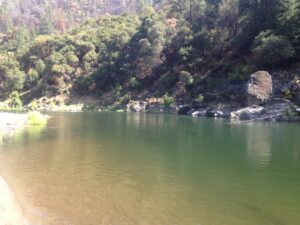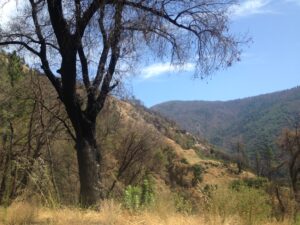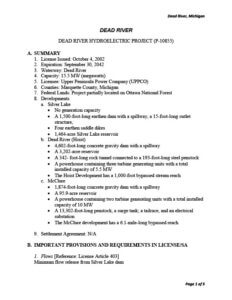CSPA Marks Poe Hiking Trail Victory over PG&E
The California Sportfishing Protection Alliance (CSPA), along with American Whitewater (AW), scored a significant victory on October 20, 2022 when the Federal Energy Regulatory Commission (FERC) issued an Order reaffirming a requirement that Pacific Gas and Electric Company must construct a “Poe Hiking Trail” along the North Fork Feather River.
The Order gave PG&E 90 days to file with FERC a plan and schedule for construction of a trail in the lower reaches of the Feather River Canyon. PG&E must also consult with the U. S. Forest Service, California Department Fish and Wildlife, Butte County, AW, CSPA, and a person who has already built part of the trail, regarding the final route for the Poe Hiking Trail.

Pool in Poe reach of the North Fork Feather River (photo by Chris Shutes)
PG&E fought this recreational enhancement near its facilities for over a decade. PG&E increased its opposition after 2018, when FERC issued PG&E a new license to operate the Poe Powerhouse on the river. The hydropower project is located in large part within the Plumas National Forest.
In March 2007, as part of the relicensing process, FERC staff issued an Environmental Assessment for the project, finding: “There is need for recreation enhancement in the project area, which is in a particularly scenic reach of the [North Fork Feather River], and [that] these enhancements would likely be utilized immediately by recreational users.” In 2019, FERC ordered PG&E to conduct a feasibility study on improving the trails near the Poe Powerhouse.
PG&E completed the feasibility study, which reported: “The backdrop [of the Poe Hiking Trail] is stunning and allows for a valuable recreational trail experience that provides amazing vistas and access to the North Fork of the Feather River.” But PG&E disregarded the positive conclusions its own consultants drew in the study. PG&E did not include construction of the hiking trail when PG&E filed its required Recreation Plan in September 2020. Instead, PG&E’s Recreation Plan strongly argued against the feasibility study, notably claiming that the proposed trail would cost $2.5 million more than the feasibility study estimated.

Feather River Canyon in Poe reach of the North Fork Feather River (photo by Chris Shutes)
Nonetheless, in February 2022, FERC ordered PG&E to consult with stakeholders on a final route for the Poe Hiking Trail and to provide, within six months, a plan and schedule for constructing the trail. In March 2022, PG&E filed a “rehearing request” (appeal) with FERC to continue to fight against the hiking trail requirement.
In yet another effort to avoid beginning work on the ordered Poe Hiking Trail plan, PG&E filed a request with FERC in August 2022 for an extension of time to file the plan until FERC issued a decision on PG&E’s rehearing request.
On August 18, 2022, CSPA and American Whitewater filed a Complaint of Non-Compliance with License Requirements, opposing PG&E’s request for extension of time “because the request is not based on [PG&E’s] need for additional time to continue good-faith work to comply with license requirements but is rather an attempt to stay the Commission’s Recreation Plan Order pending the Commission’s further reconsideration of PG&E’s request for rehearing.” CSPA and AW’s complaint requested that FERC promptly issue an order instructing PG&E to fulfill its Poe Hiking Trail license obligations in good faith.
Subsequently, FERC issued the October 20 Order denying the rehearing request and giving PG&E 6 months to consult and submit a plan. To its partial credit, PG&E’s staff has now begun scheduling the required consultation.
It just should not be this hard. PG&E’s managers need to stop trying to reinvent terms because they don’t like outcomes. As the FERC Order put it: “Even if the cost for the trail were closer to PG&E’s estimate, we would continue to find construction of the trail feasible.”
And CSPA and AW, and other NGO hydropower advocates, should not have to make half a dozen filings over 15 years to make sure that PG&E does not wiggle out of a simple mitigation.


